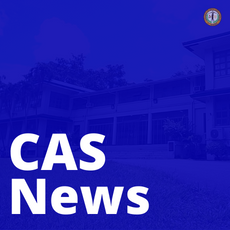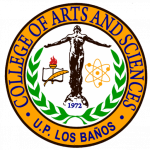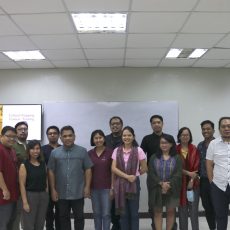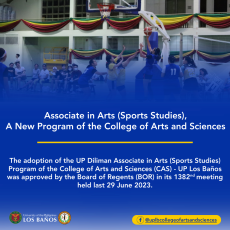

Dr. VACHEL GAY V. PALLER : UP Scientist III
Institute of Biological Sciences
Dr. Vachel Gay V. Paller`s field is not one for the faint-hearted. Studying the biology of human and animal/livestock/fish parasites is important in promoting a healthy, productive population. With this knowledge, scientists can formulate mitigating measures to address human public health concerns or agricultural productivity issues. Her passion and dedication to the field has inspired not only her IBS colleagues but her student advisees too. Ma`am Gay’s research interest also include understanding the biology and ecology of Philippine freshwater fishes, an important factor in ensuring sustainable, profitable, and safe aquaculture supply.

Dr. IRENEO L. LIT, JR. : UP Scientist III
Institute of Biological Sciences
Dr. Ireneo L. Lit Jr., fondly called Sir Jun by the IBS community, is an expert on insects. He discovered a number of species in islands across the Philippines including Polilio. A renowned and well-respected entomologist in the Philippines, he has extensively studied some of the most interesting Philippine insects such as the scale and stick insects. His contributions to the body of entomological and ecological science in the Philippines cannot be undermined. He conducts research on cave ecology and biodiversity of cave insect species too. Dr. Lit is a prime mover in developing courses and creating opportunities that would further the field of ecology in the Philippines. He loves mentoring young biologists. Incidentally, during his free time, Dr. Lit writes poems to everyone’s delight.

Dr. AIMEE LYNN B. DUPO : UP Scientist II
Institute of Biological Sciences
Known as the Spider Woman of IBS, Dr. Aimee Barrion-Dupo devoted most of her scientific research career in studying Philippine insects and spiders for which she garnered various recognitions. Her studies also involve the ecology and diversity of insects and spiders found in the Philippines. As the chair of the UPLB Bee Program, she serves to equip beekeepers with the latest know-how and, to further this field, she undertake valuable in the field. She is currently also mentoring graduate students as secretary the Graduate School.

Dr. MERLYN S. MENDIORO : UP Scientist I
Institute of Biological Sciences
Dr. Merlyn S. Mendioro, the current director of the Institute, is an expert in Genetics, Agronomy and Plant Breeding –fields that have utmost importance in securing food to be made available for every Filipino. Her scientific career yielded valuable research outputs in cytogenetics, genetic diversity analysis, and DNA barcoding. With a passion for science that never waned through all these years, Ma`am Merlyn has mentored students who eventually become medical doctors, scientists, policy makers and leaders in science, following her footsteps. Her energy and vision for IBS inspires the constituents to strive for a better and brighter future for the institute.

Dr. MARIBEL D. SESE : UP Scientist I
Institute of Biological Sciences
A pillar in the Institute, Dr. Maribel Dioniso-Sese contributes significantly in addressing the issue of food security, a major concern of UPLB in its effort to recalibrate and refocus resources and research toward this goal. Her timely research work in microalgae and plant biology is directly related to the aim of making available and securing food for the Filipino population. Specifically, her research career focuses on studying how plants and microalgae respond to various abiotic stresses, regulating their gene expression, identifying economically important metabolites in them, characterization and molecular interaction of plant photoreceptors. (RJD Flores)

Dr. EDITHA C. JOSE : UP Scientist I
Institute of Mathematical Sciences and Physics
Dr. Editha C. Jose’s primary area of research focuses on partial differential equation (PDE), determining the existence and uniqueness of solutions. Her work on PDE homogenization and controllability has opened more avenues to further the understanding of natural and physical processes. PDEs are fundamental to the study of these phenomena. For instance, the thermal conductivity of a material is described by a parabolic PDE more often referred to as the heat equation. In general, however, solutions to differential equations are not only difficult to obtain but also require a proper or more suitable mathematical formulation. Homogenization and control theories offer alternative techniques in representing PDE solutions or characterizing them. The goal is to derive simplified (macroscopic) models in which microscopic heterogeneities arise and find a control that will lead to a desirable situation. Dr. Jose’s sustained commitment to research has strengthened local and international partnerships with fellow mathematicians and experts from other disciplines.

Dr. ALLAN ABRAHAM B. PADAMA : UP Scientist I
Institute of Mathematical Sciences and Physics
Dr. Allan Abraham B. Padama, who joined IMSP in October 2014, used his OVPAA Balik-PhD grant to establish a research group and computing facility in the institute. To date, his research work has garnered a total of 210 citations (188 since 2013), an h-index of 9 and i10-index of 6. To exemplify the importance of Dr. Padama’s research in both in basic surface science and industrial applications, consider the following application: Copper (Cu) is a cheap metal that is abundant in the country. However, its non-reactive nature limits its use in industry. Gas-surface interactions, for instance, still prefer expensive but reactive metals (Palladium (Pd), Platinum (Pt), etc.) because of their known efficiency in facilitating reactions. Results so far show that small amounts of Pd atoms arranged in an aggregated configuration can improve the reactivity of CuPdwhich, in turn, may serve as alternative to expensive metals for industrial use.

Dr. JOMAR F. RABAJANTE : UP Scientist I
Institute of Mathematical Sciences and Physics
Dr. Jomar F. Rabajante uses mathematical formulations to further understand both the microscopic and macroscopic levels of biological interactions. In his paper entitled “Equilibrium switching and mathematical properties of nonlinear interaction networks with concurrent antagonism and self-stimulation” (Chaos, Solitons and Fractals 73:166-182), he presents a dynamical system of coupled nonlinear differential equations with arbitrary dimension and adjustable parameters. The work has been extended to represent a dynamic Waddington’s epigenetic landscape of cell-fate determination and demonstrate multi-lineage cell differentiation at varied time scales (Progress in Biophysics & Molecular Biology 117:240-249). Numerical results unify theories of branching and structural oscillations in cell-fate determination, which reveals key temporal patterns of cell differentiation and associated diseases such as cancer.
Currently, Dr. Rabajante serves as lead investigator of a project funded by the International Foundation for Science. He is also co-project leader of a CHED-PCARI Project entitled “Glycoproteomics of Filipino Lung Cancer Cell Lines for Biomarker Discovery and Anti-Cancer Screening of Natural Products.” (CMN Piñol)



